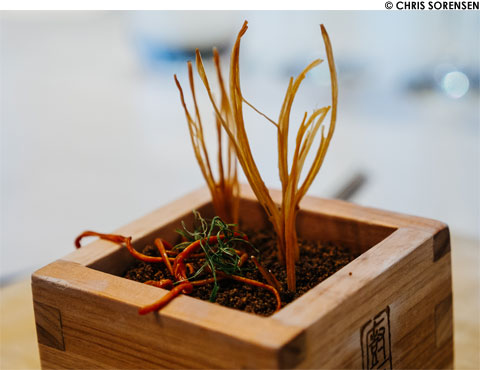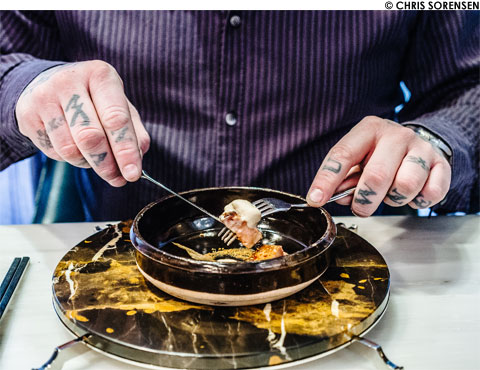
"Dead Garden" at BO Innovation
|
SECOND COURSE: DEAD GARDEN, MOLECULAR SOUP DUMPLINGS
We head back to the main road to catch a ding ding. The oldest and cheapest transportation in Hong Kong, the ding ding is a narrow double-decker wooden-seat trolley that crawls through traffic much like the E line on South Huntington. We've got reservations at Bo Innovation, home to "X-treme Chinese Cuisine" (Jamie and I exchange raised eyebrows), for lunch in Wan Chai.
Bo Innovation is exactly as we imagined it would be, posh and populated with patrons who sip their wine languidly and adjust their sparkling jewelry after every course. They're all eating very carefully, and I feel momentarily on edge because no one is eating in the ravenous, joyous way we've seen elsewhere. The menu is classic El Bulli 2000, from a dish called "Dead Garden" — a composed planter box of morel dirt, scallion puree that reminds me of green Gak, and caterpillar fungus — to the molecular xiao long bao, a soup dumpling the size of a marble that pops like a Gusher under your teeth. All eight courses arrive with an oft-replenished wine pairing, which means we're all feeling pretty good by course four.
While we wait for the next plates, we volley Jamie the classic chef questions: if you could serve one thing for the rest of your life, if you could eat one thing for the rest of your life, when was the first time you ate this or that. Italian or Spanish food, tripe with pasta, and eggs top his list of what he'd serve; Thai or Mexican food, and eggs, make up his personal favorites. Eggs, eggs, and more eggs.
As a result of his hardcore-kid, straight-edge background, Jamie was off-and-on vegan until he was 22. That came to an end while he was working at L'Arpège in Paris, where he was told he would be fired (and that he would never amount to anything) if he didn't taste everything. His love affair with foie gras blossomed shortly thereafter, he tells us, as our sixth course, foie "mui choy" (preserved mustard greens) with mui choy ice cream and crispy mui choy leaf, lands in front of us. His passion for all things offal is not entirely divorced from his vegan sensibilities: if you're going to eat the animal, you respect it and waste nothing.
Fred, our tour guide, has been fascinated by Jamie's tattoos from the first moment we met up, and it isn't long before he's noticed his knuckles, where letters lock up to form the word "unwanted." Fred asks what it means, and Jamie tells him it's a family thing. Nobody asks for clarification.

Foie "mui choy" |
It's not something he finds it easy to speak about. I once interviewed Jamie at Tasty Burger for a story about chefs on Instagram, and wound up instead talking about the nature of fame. He told me that after he and his mother had a falling out in 1997 over his choice to work for nothing during his first stage, he had his knuckles inked.
"When I first started cooking, I was disowned by some of my family for making that choice," he'd said, with a bit of an edge in his voice. "Having somebody say then that being a chef is a second-choice career absolutely happened, and now it's something that people strive for."
He shook his head, like he'd awoken from a long sleep. "Now these little kids come into the restaurants, and their parents are like, 'He wants to be a chef; he watches lots of TV and saw you on Chopped,' or whatever. Now, it seems we have more credibility as members of society. To me, I'm still that weird punk kid who gets a little too drunk sometimes and says inappropriate things."
And here we are, in a fancy restaurant in Hong Kong, where people fall all over themselves to accommodate him and he waxes poetic on the virtues of riesling.
There is a pink-haired, tattooed chef at the open kitchen, and Jamie thanks him before blinking in the sunlight as we leave for a walk through Wan Chai, one of the oldest districts in the city. The apartment complexes lining the hills are emerald green, teal, orange, cerulean, yellow, mandarin orange, and lavender, all in a row. The buildings are old, wooden, and rickety, and all of the new restaurants and shops and tenants have simply curled round and round themselves — like a cat picking a spot to doze — and settled into the historic spaces.
We pop into an indoor fish and meat market where things are still flipping and flopping around on beds of ice. A headless eel seizes its muscles, the nerves working themselves out, and slabs of just-halved fish still have beating hearts. Jamie inspects everything like it might have a place on tonight's menu at Coppa, 8000 miles away.